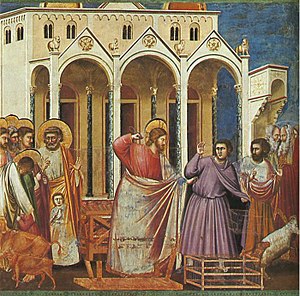One thing that may puzzle you is the emphasis on dandelions. You’ll see there a famous picture of Chesterton graciously accepting the gift of a dandelion from a young admirer next to an ugly brick wall. The page itself has a dandelion motif at the top (along with a picture of Oxford’s dreaming spires among which the Library is located). But dandelions are a pest, and a weed. They are the gardener’s bane – constantly spreading, rooting deeply, hard to kill. Their little golden faces are so lurid they could almost be called ugly. Looking unkempt, they creep into places deprived of human care and attention.
I have seen whole landscapes spoilt by unchecked dandelions (in Lithuania, for example). And yet everything that lives is holy, and Chesterton is a great inspiration to us because he would love and cherish and defend everything as a direct gift of the Creator and an expression of his wisdom and beauty. In his first book of essays, The Defendant (1901), he defended, among other things, skeletons, cheap thrillers, china shepherdesses, slang, planets, and ugly things in general. He even defended defending them in the Introduction. Yet he left it to the end of his life, to the last pages of his Autobiography, to mount a proper defence of dandelions. He mentions asking in his earliest juvenile poems, "through what incarnations or prenatal purgatories I must have passed, to earn the reward of looking at a dandelion."
He goes on, this mystic of the ordinary, to defend his whole philosophy of life by means of a dandelion. And we want to preserve his precious words, as dense and prolific as the petals of a dandelion. Others choose more noble flowers as their emblem – the rose or the lily. But Chesterton’s emblem is a golden flower that no one values, the seeds of which were handed him by a little child."I do not believe in Reincarnation, if indeed I ever did; and since I have owned a garden (for I cannot say since I have been a gardener) I have realised better than I did that there really is a case against weeds. But in substance what I said about the dandelion is exactly what I should say about the sunflower or the sun, or the glory which (as the poet said) is brighter than the sun. The only way to enjoy even a weed is to feel unworthy even of a weed."
A longer version of this article appeared in Gilbert! magazine. A rather different piece along the same lines – "The Romance of Receptiveness" – was published on the Imaginative Conservative website in August 2013.


